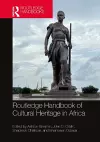
Routledge Handbook of Critical African Heritage Studies
4 contributors - Hardback
£230.00
Shadreck Chirikure graduated with a Masters of Arts in Artefact Studies Degree and a PhD in Archaeology from the Institute of Archaeology, University College London. Chirikure was born into one of the most senior houses of the Gutu-Rufura people in rural Zimbabwe. During his childhood years, Chirikure’s grandmother was a potter and a number of men were forging scrap iron in his village. Therefore, negotiating through rituals and taboos embedded in pottery making and other categories of practice were part of Chirikure’s experience growing up. Unknown to him, these would be part of his academic routine when he later became an archaeologist. Because of this village experience, Chirikure always attempts to gestate archaeological reconstructions that are tempered with local realities where nothing was fixed in space and time. His main research marries techniques from earth and engineering sciences with those from more humanistic disciplines to study high temperature technologies such as metallurgy and pottery making to enlighten their contribution to societal development. Currently, Chirikure’s work on the metallurgy of the World Heritage Sites of Great Zimbabwe and Khami in southern Africa is throwing new light on the contribution of metals to culture contact, interaction, and social differentiation. The work shows that metals, like cattle were a pivot on which society achieved growth and renewal. Shadreck has published extensively on the subject including a book, multiple journal articles, book chapters and contributions prestigious encyclopaedias. In the process, he won several national and international awards for his contributions to African Iron Age research.